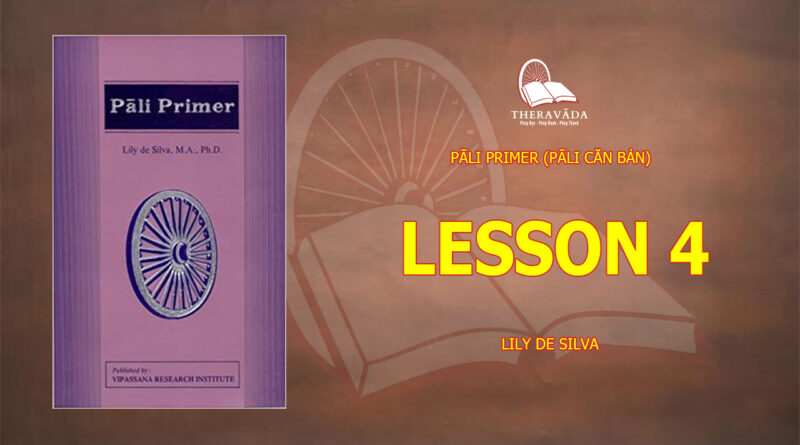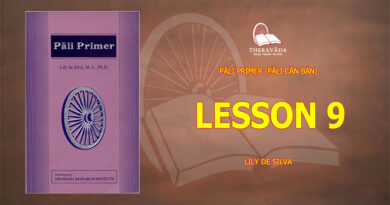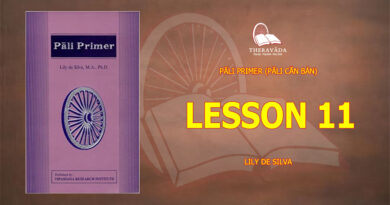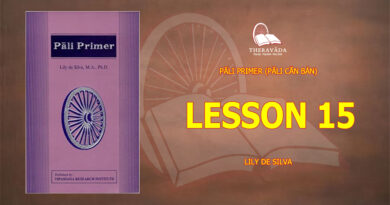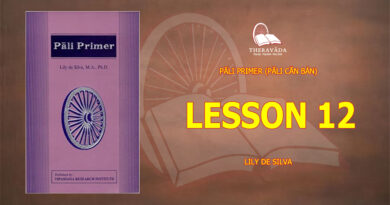Lesson 4
VOCABULARY
1. Masculine nouns ending in -a
| dhīvara | fisherman |
| maccha | fish |
| piṭaka | basket |
| amacca | minister |
| upāsaka | lay devotee |
| pāsāda | palace |
| dāraka | child |
| sāṭaka | garment |
| rajaka | washerman |
| sappa | serpent |
| pañha | question |
| suka / suva | parrot |
| sopāna | stairway |
| sūkara / varāha | pig |
Verbs
| patati | falls |
| dhovati | washes |
| icchati | wishes, desires |
| ḍasati | bites |
| pucchati | questions |
| pakkosati | calls, summons |
| khādati | eats |
| hanati | kills |
| otarati | descends |
| nikkhamati | leaves, sets out |
2. Declension of masculine nouns ending in -a (contd.)
Ablative case:
Case endings -ā / -mhā / -smā are added to the nominal base to form the ablative singular.
Case ending -ehi is added to form the ablative plural; -ebhi is an archaic ending that is also used.
Singular:
1. nara + ā / mhā / smā = narā / naramhā / narasmā (From the man)
2. mātula + ā / mhā / smā = mātulā / mātulamhā / mātulasmā (From the uncle)
3. kassaka + ā / mhā / smā = kassakā / kassakamhā / kassakasmā (From the farmer)
Plural:
1. nara + ehi = narehi (narebhi) (From men)
2. mātula + ehi = mātulehi (mātulebhi) (From uncles)
3. kassaka + ehi = kassakehi (kassakebhi) (From farmers)
3. Examples in sentence formation
Singular:
1. Yācako naramhā bhattaṃ yācati.
The beggar asks for rice from the man.
2. Putto mātulamhā pañhaṃ pucchati.
The son asks a question from the uncle.
3. Kassako rukkhasmā patati.
The farmer falls from the tree.
Plural:
1. Yācakā narehi bhattaṃ yācanti.
Beggars ask for rice from men.
2. Puttā mātulehi pañhe pucchanti.
Sons ask questions from uncles.
3. Kassakā rukkhehi patanti.
Farmers fall from trees.
Exercise 4
4. Translate into English:
1. Corā gāmamhā pabbataṃ dhāvanti.
2. Dārako mātulasmā odanaṃ yācati.
3. Kumāro sopānamhā patati.
4. Mātulā sāṭake dhovanti.
5. Dhīvarā piṭakehi macche āharanti.
6. Upāsakā samaṇehi saddhiṃ vihārasmā nikkhamanti.
7. Brāhmaṇo kakacena rukkhaṃ chindati.
8. Kumārā mittehi saha bhūpālaṃ passanti.
9. Vāṇijo assena saddhiṃ pabbatasmā oruhati.
10. Yācako kassakasmā soṇaṃ yācati.
11. Sappā pabbatehi gāmaṃ otaranti.
12. Amaccā sarehi mige vijjhanti.
13. Coro gāmamhā sakaṭena sāṭake harati.
14. Bhūpālo amaccehi saddhiṃ rathena pāsādaṃ āgacchati.
15. Sūkarā pādehi āvāṭe khaṇanti.
16. Kumāro sahāyakehi saha sāṭake dhovati.
17. Samaṇā gāmamhā upāsakehi saddhiṃ nikkhamanti.
18. Kukkuro piṭakamhā macchaṃ khādati.
19. Mitto puttamhā sunakhaṃ yācati.
20. Buddho sāvake pucchati.
21. Amaccā paṇḍitehi pañhe pucchanti.
22. Rajako sahāyena saha sāṭakaṃ dhovati.
23. Macchā piṭakamhā patanti.
24. Corā pāsāṇehi varāhe paharanti.
25. Amacco pāsādamhā suvaṃ āharati.
5. Translate into Pāli:
1. Horses run from the village to the mountain.
2. Merchants come from the island to the monastery with lay devotees.
3. Thieves shoot pigs with arrows.
4. The lay devotee questions (about) the dhamma from the recluse.
5. The child falls from the rock with a friend.
6. The dog bites the child.
7. Ministers set out from the palace with the king.
8. The man brings a deer from the island.
9. The farmer gets down from the tree.
10. Dogs run along the road with horses.
11. Boys take away lamps from merchants.
12. The thief gets down from the stairway.
13. Merchants bring parrots from mountains.
14. The horse hits the serpent with its foot.
15. The uncle, with his friends, sees recluses from the mountains.
16. Merchants bring horses to the palace from the island.
17. The minister questions the thief.
18. The farmer eats rice with the washerman.
19. The child falls from the stairway.
20. The fisherman climbs the mountain with his uncle.
21. The beggar, together with his dog, sleeps.
22. Kings protect islands with their ministers.
23. The king worships the Buddha from his palace.
24. The man kills a serpent with a sword.
25. Fishermen bring fish to the village in carts.
26. Pigs run from the village to the mountain.
27. Lay devotees ask questions from the wise man.
28. The son brings a parrot from the tree.
29. Wise men go to the monastery.
30. Disciples go along the road to the village.
-ooOoo-

